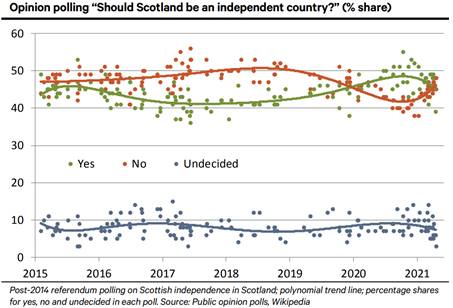
Click here for full report and disclosures
â An election that matters: Upcoming Scottish parliamentary elections on 6 May could result in a majority for parties in favour of Scottish independence. Such an outcome could make waves in markets and refuel worries about the UKâs prospects following Brexit â which has raised the tail risk that Scotland may one day leave the UK to re-enter the EU as an independent country. 62% of Scots voted in favour of the UK staying in the EU in June 2016.
â Three steps to Scottish independence: 1) Pro-independence parties would need to win the 6 May election â likely but far from certain; 2) the UK parliament would need to grant a Scottish request for a new referendum (as in 2014) â possible but not likely; 3) Scottish nationalists would need to win the referendum, having lost the first one in September 2014 by 55.3% to 44.7% and despite current opinion polls moving against them (see chart) â highly uncertain. While we probably have to brace ourselves for significant noise, that Scotland would leave the UK in the end remains unlikely.
â How does the election work? Scottish elections are based on a hybrid system combining constituency and regional votes. 73 members of parliament (MPs) are elected in their constituencies on a first-past-the-post system. 56 additional seats are allocated via proportional representation. This makes opinion polls even harder to judge than usual.
â Latest SNP polling: According to the last five polls, the major pro-independence party, the Scottish National Party (SNP), can expect 49% of the constituency vote and 39% of the regional vote. While support for the SNP is now at a similar level as ahead of the May 2016 Scottish election in the constituency votes, it remains around 5ppt lower in the regional polling. In 2016 the SNP won 63 seats â two shy of a majority. But thanks to the six seats won by the pro-independence Scottish Greens, the election yielded a small overall majority for pro-independence MPs.
â The Greens/Alba factor: Support for the SNP has fallen by nearly 10 points in recent weeks following a series of scandals related to the partyâs current leader Nicola Sturgeon and its ex-leader Alex Salmond â who recently established a new pro-independence âAlba Partyâ to run for regional seats only. If the SNP falls short of a majority on its own, a decent result for the Greens and Alba may still tip the parliamentary majority in favour of Scottish independence. While the Greens look set to win a handful of seats again, it is not clear whether votes for Alba â which is polling at 3% in the regional vote â will increase the number of pro-independence MPs or simply bleed support from the SNP.
â Johnson¡¦s big decision: UK Prime Minister Boris Johnson could have a hard choice to make if pro-independence parties win a majority and ask for a referendum. He could call their bluff and grant such a vote â which the Scottish nationalists may well lose judging by recent poll trends. A second vote against independence would put the question to bed for good, as it once did in Canadaâs province of Quebec. Alternatively, with his 80-seat majority, he could ask the UK Parliament to not approve a second Scottish vote. In any legal challenge to such a decision, Johnson could probably rely on the UK Supreme Court to back the decision of the UK Parliament. Probably, Johnson will go for the latter option, having learned the lesson of then-PM David Cameronâs decision to roll the dice on the Brexit vote in 2016 â only to lose it against the strong initial odds in favour of the UK deciding to remain in the EU.
Chief Economist
+44 20 3207 7889
holger.schmieding@berenberg.com
Senior Economist
+44 20 3465 2672
kallum.pickering@berenberg.com
Disclosures
This material is intended as commentary on political, economic or market conditions for institutional investors or market professionals only and does not constitute a financial analysis or a research report as defined by applicable regulation. See the "Disclaimers" section of this report.
The commentary included herein was produced by Joh. Berenberg, Gossler & Co. KG (Berenberg). For sales inquiries, please contact:
Phone: +44 (0)20 3207 7800
Email: berenberg.economics@berenberg.com
BERENBERG
Joh. Berenberg, Gossler & Co. KG
Neuer Jungfernstieg 20
20354 Hamburg
Germany
Registered Office: Hamburg, Germany
Local Court Hamburg HRA 42659
Joh. Berenberg, Gossler & Co. KG is a Kommanditgesellschaft (a German form of limited partnership) established under the laws of the Federal Republic of Germany registered with the Commercial Register at the Local Court of the City of Hamburg under registration number HRA 42659 with its registered office at Neuer Jungfernstieg 20, 20354 Hamburg, Germany. A list of partners is available for inspection at our London Branch at 60 Threadneedle Street, London, EC2R 8HP, United Kingdom.
Joh. Berenberg, Gossler & Co. KG is authorised by the German Federal Financial Supervisory Authority (BaFin) and deemed authorised and regulated by the Financial Conduct Authority. The nature and extent of consumer protections may differ from those for firms based in the UK. Details of the Temporary Permissions Regime, which allows EEA-based firms to operate in the UK for a limited period while seeking full authorisation, are available on the Financial Conduct Authorityâs website. For further information as well as specific information on Joh. Berenberg, Gossler & Co. KG, its head office and its foreign branches in the European Union please refer to http://www.berenberg.de/en/corporate-disclosures.html.
